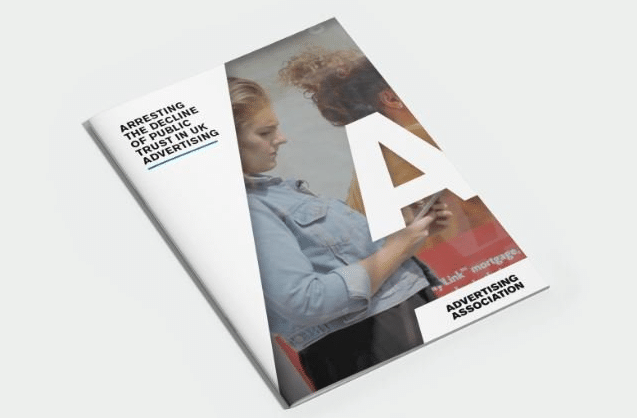
The report: ‘Arresting The Decline Of Public Trust In UK Advertising’, launched this week at the ISBA conference, contains research from Credos into the primary reasons why public trust in advertising has fallen over the past few decades.
It identifies six overarching factors affecting public perceptions of advertising, from bombardment to unhealthy advertising.
The report also highlights five actions the advertising industry should undertake in order to arrest that decline, and sets out criteria by which the success of those actions can be measured.
Those actions are:
- To reduce advertising ‘bombardment’
- To reduce excessive advertising frequency and re-targeting
- To ensure that the ASA is “best in class”
- To ensure that data privacy matters
- To show that advertising can drive social change
For the past few months the Advertising Association and its president Keith Weed have made rebuilding public trust in advertising their top priority.
Speaking at LEAD ’19, the industry’s flagship advertising conference, Weed explained that it is now “trust or bust” for the industry.
“Ultimately, advertising does good but with trust in decline, we risk it losing that positive influence. A brand without trust is simply a product and advertising without trust is just noise.
The Advertising Association is pioneering a change to rebuild public trust in advertising but success requires collaboration from all industry players. It’s trust or bust and I choose trust.”
The report comes a day after the publication of a global study commissioned by Facebook that found the majority of people did not trust the internet with their personal information.
The AA, which carried out qualitative and quantitative research including a survey of 2,000 UK adults, has created a framework of the factors that influence a person’s views about advertising.
‘Negative factors’
It found that their perceptions of the benefits of advertising – including its ability to inform, and fund media services – accounted for just over half (51%) of their level of favourability.
The rest of their views were shaped by negative factors, with around half of this (24%) determined by bombardment, which includes four components: excessive volume, repetition, obtrusiveness and irrelevance of ads.
The remainder of people’s perceptions were shaped by concerns about its impact on vulnerable groups (12%), promoting unhealthy food and drink or alcohol (5%), intrusiveness (5%) – meaning when advertising infringes upon someone’s privacy – and suspicious techniques (3%) such as using T&Cs to “hide” important information.
Five part strategy
The report outlines a five-part strategy the AA will pursue: to reduce bombardment; reduce excessive frequency and re-targeting; ensure the Advertising Standards Authority is “best in class”; ensure that data privacy matters; and show that advertising can drive social change.
In each of these cases, the AA said its role included promoting best practice and working towards a joined-up approach, with businesses and other trade bodies singing from the same hymn sheet.
It said it would tackle obtrusiveness – meaning when ads badly interrupt or delay the user experience – by working to get advertising companies signed up to IAB UK’s gold standard, and would crack down on excessive re-targeting, which can create the sense of being “followed around” the internet by ads, by making sure the industry is “joined up about best practice”.
Commenting on the report, Parry Malm, CEO and founder of Phrasee, said: “The findings of the Advertising Association’s report reveal that it’s time for advertisers and marketers to take responsibility for their actions and to realise there is more to what they do than just selling a few more widgets. Marketers actually bear a social responsibility, and if they want to create enduring, successful relationships with their customers, they need to stop treating people like bottomless pits of surplus to extract – and change their marketing accordingly. No consumer wants a constant barrage of sales messages driven by guilt, fear and anxiety. I agree with the AA – it’s time for the industry to take a more positive approach.
In a high-tech world, having a strong ethical approach is more important than ever. Phrasee is an AI marketing company that believes everyone shares a responsibility to collectively drive an ethical marketing agenda. That’s why we have codified our ethics policy. We will not use data to target vulnerable populations, we won’t promote the use of negative emotions to exploit people and we don’t work with customers whose values don’t align with ours. We want the rest of the industry to join our Emotions Matter campaign, which seeks to drive long-term change in the sector by empowering marketers to take a proactive approach and change their behaviours.”
